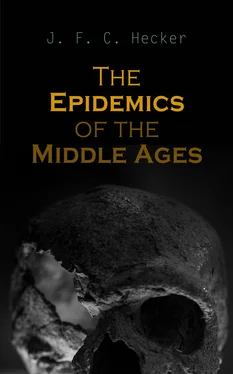The signs of terrestrial commotions commenced in Europe in the year 1348, after the intervening districts of country in Asia had probably been visited in the same manner.
On the island of Cyprus, the plague from the East had already broken out; when an earthquake shook the foundations of the island, and was accompanied by so frightful a hurricane, that the inhabitants who had slain their Mahometan slaves, in order that they might not themselves be subjugated by them, fled in dismay, in all directions. The sea overflowed—the ships were dashed to pieces on the rocks, and few outlived the terrific event, whereby this fertile and blooming island was converted into a desert. Before the earthquake, a pestiferous wind spread so poisonous an odour, that many, being overpowered by it, fell down suddenly and expired in dreadful agonies 36.
This phenomenon is one of the rarest that has ever been observed, for nothing is more constant than the composition of the air; and in no respect has nature been more careful in the preservation of organic life. Never have naturalists discovered in the atmosphere foreign elements, which, evident to the senses, and borne by the winds, spread from land to land, carrying disease over whole portions of the earth, as is recounted to have taken place in the year 1348. It is, therefore, the more to be regretted, that in this extraordinary period, which, owing to the low condition of science, was very deficient in accurate observers, so little that can be depended on respecting those uncommon occurrences in the air, should have been recorded. Yet, German accounts say expressly, that a thick, stinking mist advanced from the East, and spread itself over Italy 37; and there could be no deception in so palpable a phenomenon 38. The credibility of unadorned traditions, however little they may satisfy physical research, can scarcely be called in question when we consider the connexion of events; for just at this time earthquakes were more general than they had been within the range of history. In thousands of places chasms were formed, from whence arose noxious vapours; and as at that time natural occurrences were transformed into miracles, it was reported, that a fiery meteor, which descended on the earth far in the East, had destroyed every thing within a circumference of more than a hundred leagues, infecting the air far and wide 39. The consequences of innumerable floods contributed to the same effect; vast river districts had been converted into swamps; foul vapours arose everywhere, increased by the odour of putrified locusts, which had never perhaps darkened the sun in thicker swarms 40, and of countless corpses, which, even in the well regulated countries of Europe, they knew not how to remove quickly enough out of the sight of the living. It is probable, therefore, that the atmosphere contained foreign, and sensibly perceptible, admixtures to a great extent, which, at least in the lower regions, could not be decomposed, or rendered ineffective by separation.
Now, if we go back to the symptoms of the disease, the ardent inflammation of the lungs points out, that the organs of respiration yielded to the attack of an atmospheric poison—a poison, which, if we admit the independent origin of the Black Plague at any one place on the globe, which, under such extraordinary circumstances, it would be difficult to doubt, attacked the course of the circulation in as hostile a manner as that which produces inflammation of the spleen, and other animal contagions that cause swelling and inflammation of the lymphatic glands.
Pursuing the course of these grand revolutions further, we find notice of an unexampled earthquake, which, on the 25th of January, 1348, shook Greece, Italy, and the neighbouring countries. Naples, Rome, Pisa, Bologna, Padua, Venice and many other cities suffered considerably: whole villages were swallowed up. Castles, houses and churches were overthrown, and hundreds of people were buried beneath their ruins 41. In Carinthia, thirty villages, together with all the churches, were demolished; more than a thousand corpses were drawn out of the rubbish; the city of Villach was so completely destroyed, that very few of its inhabitants were saved; and when the earth ceased to tremble, it was found that mountains had been moved from their positions, and that many hamlets were left in ruins 42. It is recorded that, during this earthquake, the wine in the casks became turbid, a statement which may be considered as furnishing a proof, that changes causing a decomposition of the atmosphere had taken place; but if we had no other information from which the excitement of conflicting powers of nature during these commotions might be inferred, yet scientific observations in modern times have shewn, that the relation of the atmosphere to the earth is changed by volcanic influences. Why then, may we not, from this fact, draw retrospective inferences respecting those extraordinary phenomena?
Independently of this, however, we know that during this earthquake, the duration of which is stated by some to have been a week, and by others a fortnight, people experienced an unusual stupor and headache, and that many fainted away 43.
These destructive earthquakes extended as far as the neighbourhood of Basle 44, and recurred until the year 1360, throughout Germany, France, Silesia, Poland, England and Denmark, and much further north 45.
Great and extraordinary meteors appeared in many places, and were regarded with superstitious horror. A pillar of fire, which on the 20th of December, 1348, remained for an hour at sunrise over the pope’s palace in Avignon 46; a fireball, which in August of the same year was seen at sunset over Paris, and was distinguished from similar phenomena, by its longer duration 47, not to mention other instances mixed up with wonderful prophecies and omens, are recorded in the chronicles of that age.
The order of the seasons seemed to be inverted,—rains, floods and failures in crops were so general, that few places were exempt from them; and though an historian of this century assures us, that there was an abundance in the granaries and storehouses 48, all his contemporaries, with one voice, contradict him. The consequences of failure in the crops were soon felt, especially in Italy and the surrounding countries, where, in this year, a rain which continued for four months, had destroyed the seed. In the larger cities, they were compelled, in the spring of 1347, to have recourse to a distribution of bread among the poor, particularly at Florence, where they erected large bake-houses, from which, in April, ninety-four thousand loaves of bread, each of twelve ounces in weight, were daily dispensed 49. It is plain, however, that humanity could only partially mitigate the general distress, not altogether obviate it.
Diseases, the invariable consequence of famine, broke out in the country, as well as in cities; children died of hunger in their mothers’ arms,—want, misery and despair, were general throughout Christendom 50.
Such are the events which took place before the eruption of the Black Plague in Europe. Contemporaries have explained them after their own manner, and have thus, like their posterity, under similar circumstances, given a proof, that mortals possess neither senses nor intellectual powers sufficiently acute to comprehend the phenomena produced by the earth’s organism, much less scientifically to understand their effects. Superstition, selfishness in a thousand forms, the presumption of the schools, laid hold of unconnected facts. They vainly thought to comprehend the whole in the individual, and perceived not the universal spirit which, in intimate union with the mighty powers of nature, animates the movements of all existence, and permits not any phenomenon to originate from isolated causes. To attempt, five centuries after that age of desolation, to point out the causes of a cosmical commotion, which has never recurred to an equal extent,—to indicate scientifically the influences which called forth so terrific a poison in the bodies of men and animals, exceeds the limits of human understanding. If we are even now unable, with all the varied resources of an extended knowledge of nature, to define that condition of the atmosphere by which pestilences are generated, still less can we pretend to reason retrospectively from the nineteenth to the fourteenth century; but if we take a general view of the occurrences, that century will give us copious information, and, as applicable to all succeeding times, of high importance.
Читать дальше










